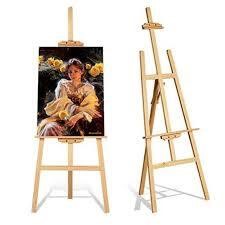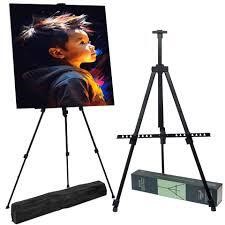Choosing an art stand takes thought. The right stand improves your work. It boosts comfort and cuts strain. Plus, it keeps your workspace neat. Below are tips for selecting a stand that fits your style.

1. Why an Art Stand is Essential

A good art stand supports your piece securely. It holds your art from various angles. This helps you work longer with less pain. The right stand enables you to focus, too. Your art stand should make creating easier.
2. Types of Art Stands
Art stands vary in shape, size, and use. Here’s a quick guide to each.
| Type of Art Stand | Best For | Key Features |
| Tabletop Stand | Small art or limited space | Compact, good for tables |
| Floor Stand | Large art and flexible angles | Adjustable height, tiltable |
| Tripod Stand | Travel-friendly, adjustable | Folds easily, lightweight |
| Studio Stand | Full-time studios | Strong, heavy-duty build |
| Wall-Mounted | Small spaces, saves floor room | Fixed on walls, sturdy |
Each stand type suits different needs. Think about what fits your space and art.
3. Choosing Your Art Stand

a. Size and Weight
Pick a stand for the size of your canvases. Tabletop stands are best for small works and floor stands are good for bigger pieces. Check weight limits before buying.
b. Adjustability
Adjustable stands are helpful. Look for height and tilt options. They let you find the right position easily. Angle control is a great feature, too.
c. Portability
If you paint on the go, a tripod is best. It’s light and easy to carry. Some stands even fold for easy travel.
d. Material and Durability
Art stands are made of wood, metal, or plastic. Wood stands look nice but are heavy. Metal is durable and light. Choose a material that suits your workspace.
e. Price Range
Price affects quality. Set a budget, but remember: a sturdy stand is worth it.
4. Ideal Stands for Different Artists

a. Beginners
A tabletop stand is great for new artists. It’s easy to use and affordable.
b. Intermediate Artists
For medium projects, a floor stand works well. It gives more flexibility and isn’t too costly.
c. Professionals
A studio stand is ideal for pros. It offers stability and lets you work at any angle.
5. Important Features to Look For

Here are key features to check:
– Angle Control: For adjusting the tilt as you work.
– Non-Slip Feet: Keeps the stand from moving around.
– Rotation: Some stands offer 360° rotation.
– Storage: Some stands have drawers or shelves.
– Height Adjustment: Useful if you stand or sit while working.
6. Setting Up Your Art Stand
Position your art stand in a well-lit area. Direct light to reduce shadows. Place a table or cart nearby for your supplies. Adjust the height to prevent strain on your body.
Availability in Other Countries
North America
– United States: Widely available in art supply stores like Blick Art Materials and online platforms like Amazon and Etsy.
– Canada: Available at local art supply stores and major retailers like Michaels.
Europe
– United Kingdom: Art stands can be found in stores like Cass Art and Hobbycraft, as well as online.
– Germany: Stores like Boesner and online retailers provide a range of art stands.
– France: Local art shops and online sites like Cultura offer various options.
Asia
– Japan: Available at specialty art supply stores and major chains like Tokyu Hands.
– India: Art stands can be found in local craft shops and online marketplaces like Flipkart and Amazon India.
Final Thoughts
The right art stand enhances your creative process. By choosing well, you’ll boost comfort, focus, and workflow. Your art stand should make creating easier and more enjoyable.

